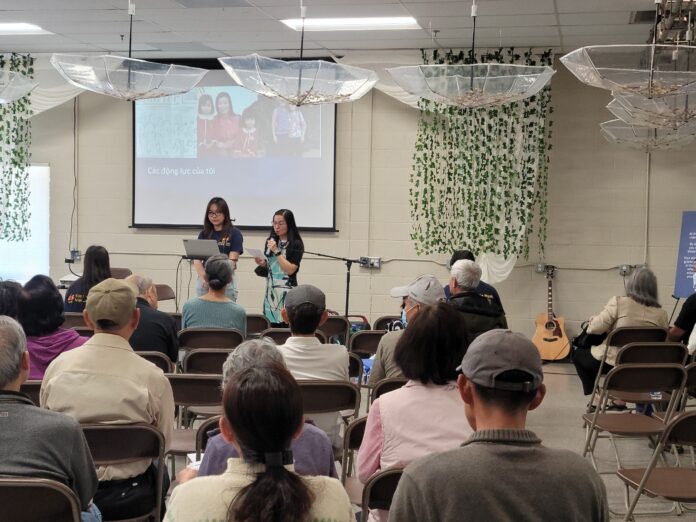The conference presented a series of speakers to medically inform the underserved Vietnamese community in Sacramento on mental health, healthy aging and diabetes
By BRANDON NGUYEN — science@theaggie.org
On May 13, UC Davis Health hosted its third annual Vietnamese Mini Medical School (VMMS), open for the Vietnamese immigrant and refugee community in Sacramento to attend.
For almost 20 years, UC Davis School of Medicine has been offering an annual highly acclaimed mini medical school program, featuring faculty who volunteer to teach free classes to the public.
In partnership with the Asian Resources Inc. (ARI), Oanh Meyer, an assistant professor of neurology at UC Davis Health and a social psychologist by training, started the VMMS back in 2021, in the thick of the pandemic. For three years now, the program has expanded to address the unique needs of Sacramento’s Vietnamese population during May annually, coinciding with Asian American and Pacific Islander Heritage Month.
“For many years, UC Davis Health had an annual mini medical school for the general community, targeting older individuals with informative presentations on cardiovascular health, brain health and so forth,” Meyer said. “Neighborhoods immediately adjacent to and south of the UC Davis Health campus are home to a large population of Vietnamese origin. Many Vietnamese Americans in Sacramento are foreign-born, lack access to culturally appropriate care and are medically underserved. So I thought of catering the MMS toward the Vietnamese community here.”
VMMS has come a long way, beginning virtually during the pandemic to now a full-blown annual conference and social event with presentations in Vietnamese. With the help of Hoa Ly, clinical research supervisor for the Alzheimer’s Disease Research Center, Meyer selected speakers, most of whom were healthcare workers and doctors whom she knew, to discuss diseases that Vietnamese individuals are more predisposed to and inform the community about preventative healthcare.
“The motivation for this is to reach out to the Vietnamese community and offer an educational day, where we go over different, selected topics on medical health,” Ly said. “This year, we had speakers discuss mental health and Alzheimer’s Disease, colon and stomach cancer screening, normal and abnormal aging and Type II Diabetes, all of which become increasingly relevant and important to the health of older Vietnamese individuals.”
Both Meyer and Ly hope that the VMMS can continue to be an accessible and reliable source of medical information that is culturally and linguistically adapted for all Vietnamese individuals in the Sacramento area.
“The event totally exceeded my expectations, with a great number of people who showed up — around 120 individuals,” Meyer said. “I always get these older Vietnamese people who come up afterward who tell me that they’re grateful that we do this for the community, and it’s very heartwarming.”
Upon reflection, Meyer hoped to expand the VMMS to include more socially interactive sections in the annual program to bring the community closer together.
“Next year, I think we might have a little bit more entertainment and fun because one of my staff, which I didn’t know he was going to do, brought a guitar during our intermission time and started playing and singing,” Meyer said. “It was amazing to see everyone getting into it, clapping, smiling and trying to sing along. So we’ll make sure to have some entertainment, so the program can be more interactive.”
According to Meyer, medically informing the public can help bridge gaps in health disparities that often arise in underserved communities, and VMMS has become just one effort to do so.
“I just think if we continue the momentum of bringing education and research to underserved communities, we can reduce the disproportionate health disparities that we often observe in specific populations and communities,” Meyer said. “That can be through the VMMS, research in different labs, like my lab which focuses on mental health and Alzheimer’s Disease in Vietnamese individuals, or just going into the community to serve and inform individuals.”
Written by: Brandon Nguyen — science@theaggie.org










